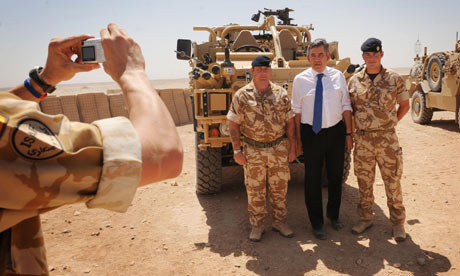
Gordon Brown unveiled a fresh strategy for the war in Afghanistan yesterday, including a controversial "reconciliation" process for Taliban elements and speedier training of an Afghan army to replace Nato troops.
Amid waning public support for the conflict, the prime minister used a visit to a British military base in Helmand province to give the first insight into changes aimed at curbing the death toll among UK soldiers.
A source close to Brown suggested negotiations with insurgents sympathetic to the Taliban, persuading them to switch sides, now formed a key component of Britain's war effort. He added: "The more reconciliation, the better."
Diplomatic sources in Helmand suggested such efforts could be on a large scale: "A large part of the Taliban are not really committed to their agenda. They are fighting for tactical reasons and can be brought back into mainstream life."
Brown also suggested the planned training of an Afghan army capable of taking responsibility for its own country's defence could be accelerated by a year, potentially speeding up the departure of Nato troops. A major US review of the military strategy due shortly is expected to focus on the same issue.
Brown promised more armoured vehicles and specialist bomb disposal teams, following widespread criticism of the protection offered to UK forces in a conflict that has claimed 208 British lives, including a Royal Marine killed yesterday morning.
The prime minister praised the "courage, bravery and patriotism" of UK personnel in his visit to Camp Bastion, after a week that confirmed 2009 as the bloodiest year on record since the US-led invasion in Afghanistan eight years ago. He admitted it had been a "most difficult summer". Speaking yesterday to both main candidates in last week's Afghan national elections, the outcome of which will finally be determined next month, Brown promised them thousands more troops.
Officials declined to be drawn on any potential increase in British troops, however, saying only that the deployment in Helmand was "under review".
David Miliband, the foreign secretary, first suggested last month talking to lower ranks of the Taliban, to encourage fighters on the ground to switch sides.
Downing Street stressed then that talks would be limited to people prepared to renounce violence, not those still actively fighting, but said Brown supported President Hamid Karzai's view that Taliban elements prepared to embrace peace could be rehabilitated.
Senior British diplomats in Helmand confirmed concerted attempts had begun to peel off Taliban elements, a move that could theoretically shorten the conflict. The strategy echoes deals done with insurgents in Iraq, as well as during the British campaign in Malaya, and in Vietnam.
For some months there have been active attempts to persuade local Taliban fighters to down weapons, with incentives to encourage them back into civilian life. However, they have had mixed success, with complaints that promises made have not always been kept.
Possible options under discussion to expand the programme include linking such integration projects more directly to foreign aid. The Afghan government would take the lead in negotiations but western troops would be expected to facilitate them, partly by enforcing security so that local fighters have the confidence to switch sides. However, the UN has argued that talks at the most senior levels of the Taliban will ultimately be necessary to resolve the conflict.
Amid 42C temperatures in Camp Bastion, a shirt-sleeved Brown shook hands with Royal Engineers, and said: "I think we can get another 50,000 Afghan army members training over the next year. Stepping that up means that the Afghans can take responsibility for their own affairs." Downing Street is proposing that Afghan troop numbers rise by 40,000 to 134,000 by next year, 12 months ahead of schedule, and to 240,000 by 2011.
That could ease frontline pressures on British combat troops, 38 of whom have been killed in the past two months.
Brown also announced another 200 British troops would be assigned specialist duties to countering IEDs (improvised explosive devices). They will be responsible for disrupting the bomb-making networks whose devices account for three-quarters of British fatalities. However, it remains unclear whether these will involve a fresh deployment or be taken from the existing force of 9,100.
Brown spent several hours discussing troop numbers with General Stanley McChrystal, US commander on the ground, whose review of the current strategy will be published shortly. He also met the head of the US marines fighting in Helmand alongside UK forces.
Among troops he met were soldiers from the Welsh Guards whose commanding officer Rupert Thornloe and company commander Sean Burchill were recently killed in separate attacks. Brown was challenged by one soldier over why they had to pay income tax while fighting overseas.
Downing Street also announced an escalation in the number of drones to spy on bomb-making factories in Helmand by next spring. Reaper drone flying hours are expected to increase by 80%.
An extra 270 armoured vehicles to protect troops from roadside bombs will also be delivered to southern Afghanistan by Christmas, including the Mastiff, considered the most IED-proof of all vehicles, the new Ridgeback troop carrier and Jackal II.
Liam Fox, the shadow defence secretary, said the government had been "woefully slow" to respond to the threat of IEDs and challenged Brown to give more details about British troop deployment. "What will happen to the extra 900 troops temporarily deployed to provide increased security for the elections – are they coming home?"
0 comments:
Post a Comment